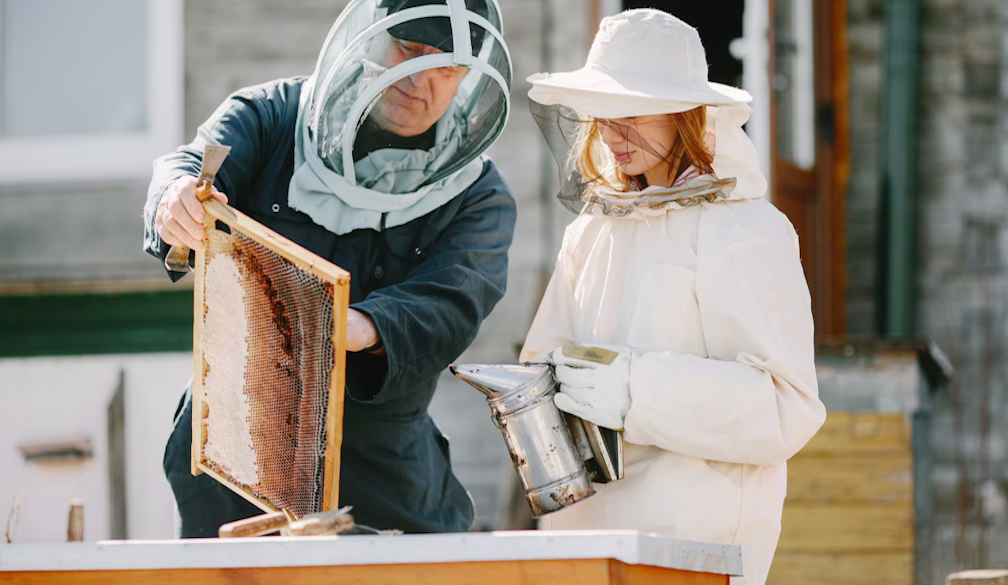Beekeeping: A Rewarding Journey into Sustainable Agriculture

Beekeeping, or apiculture, is an ancient practice that has been crucial to both agriculture and the environment for thousands of years. In recent years, it has gained popularity not only as a hobby but also as a profitable business venture. With the ongoing concerns over pollination and biodiversity, beekeeping has taken on a renewed significance. Whether you're interested in beekeeping for honey production, pollination, or simply as a way to support local ecosystems, it’s an endeavour that offers numerous benefits to both the beekeeper and the environment.
The Importance of Bees in Agriculture
Bees play a pivotal role in pollination, which is essential for the growth of many crops. Approximately one-third of the food we consume relies on pollination, and bees are responsible for pollinating about 70% of these crops. From fruits like apples and blueberries to vegetables such as cucumbers and squash, bees help increase crop yields and quality by transferring pollen between flowers.
The decline in bee populations due to various factors like pesticide use, habitat loss, and climate change has raised alarms in recent years. As a result, beekeeping has become increasingly important not only for producing honey but also for ensuring food security and biodiversity.
Getting Started with Beekeeping
If you're considering starting a beekeeping venture, there are several key aspects to consider before taking the plunge. Whether you plan to keep a few hives as a hobby or run a larger-scale operation, knowledge, and preparation are essential to success.
- Understanding Local Regulations
Before setting up your first hive, it’s important to research any local laws or regulations related to beekeeping. In some areas, you may need a permit to keep bees or comply with specific guidelines regarding hive placement, maintenance, and pest management. Ensuring that you follow all the legal requirements will save you from potential fines and prevent conflicts with neighbours.
- Choosing the Right Equipment
The equipment you choose will depend on the scale of your operation and whether you plan to keep bees for honey production, pollination, or both. The basic equipment includes:
- Bee Hives: A beehive is where the bees will live, store honey, and raise their young. Common types include Lang troth, top bar, and flow hives. Each type has its own advantages depending on the beekeeper's needs and preferences.
- Bees: You can either start with a nucleus colony (nun) or buy a full colony from an established beekeeper. The bees will need to be healthy and strong to thrive in your hive.
- Protective Gear: Beekeeping involves handling live insects, so it’s essential to have the right protective gear, including a beekeeping suit, gloves, and a veil. This will prevent stings and keep you safe while working with your bees.
- Beekeeping Tools: Essential tools include a smoker, hive tool, and a brush. The smoker helps to calm the bees, while the hive tool is used to pry apart the hive boxes. The brush is used to gently remove bees from frames when inspecting the hive.
- Selecting a Location for Your Hive
Choosing the right location for your beehive is one of the most important aspects of beekeeping. Bees need access to a variety of flowering plants for nectar and pollen, so setting up your hive near gardens, orchards, or wildflower meadows is ideal. Ensure the location is sheltered from strong winds and has adequate sun exposure to keep the hive warm.
Managing a Healthy Bee Colony
- Regular Hive Inspections
Regular inspections are vital to the success of your colony. During each inspection, you should check for:
Queen Health: The queen is the heart of the colony. A healthy queen will lay eggs regularly, ensuring the colony’s growth. If the queen is failing, you may need to replace her.
Brood Patterns: Brood refers to the eggs, larvae, and pupae inside the hive. The brood pattern should be solid and consistent, indicating a strong and healthy colony.
Honey Stores: Ensure that the bees have enough honey stored for the winter months. Beekeepers should add honey supers as necessary to allow the colony to expand its stores during the nectar flow.
Pests and Diseases: Varro mites, small hive beetles, and nosegay are common threats to bee colonies. Regular monitoring and prompt treatment of pests and diseases are critical to maintaining colony health.
- Feeding Your Bees
While bees forage for nectar and pollen, there may be times when they require supplemental feeding. This is especially true during periods of scarcity, such as early spring or late fall, when natural food sources may be low. Beekeepers can feed bees with sugar syrup or fondant to help them survive during these times.
- Managing Swarming Behaviour
Swarming is a natural behaviour in which a portion of the colony, including the old queen, leaves to establish a new hive. While this is normal, it can be detrimental to honey production, as the colony is temporarily weakened. Beekeepers can manage swarming by splitting hives, ensuring enough space for the colony to expand, and regularly monitoring for queen cells (structures that house new queens)
Final Thoughts
Beekeeping is an enriching and fulfilling practice that offers numerous benefits, from honey production to supporting the local environment. While it does come with its challenges, the rewards of maintaining healthy hives and contributing to the sustainability of pollinators make it a worthwhile endeavour. Whether you’re looking to start a small-scale hobby or enter the world of commercial beekeeping, the skills you develop will deepen your connection to nature, increase your understanding of the ecosystem, and allow you to enjoy the sweet rewards of your labour.




























